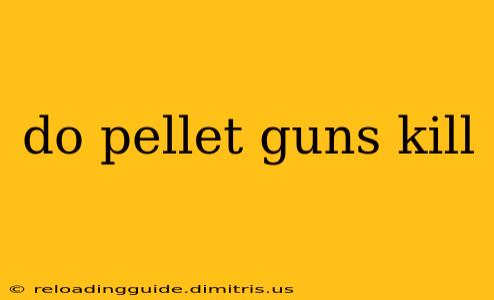The question of whether pellet guns can kill is complex and doesn't have a simple yes or no answer. While not designed as lethal weapons like firearms, under certain circumstances, pellet guns absolutely can cause fatal injuries. This article will explore the factors that determine lethality, emphasizing responsible ownership and safe handling practices.
Factors Influencing Lethality
Several crucial factors determine whether a pellet gun can inflict a fatal injury:
-
Caliber and Pellet Type: Larger caliber pellet guns (.22 caliber and above) fire heavier pellets with significantly more kinetic energy. The type of pellet also matters; pointed pellets are more likely to penetrate deeply than round ones.
-
Distance: At close range, even smaller caliber pellet guns can cause serious damage, potentially leading to death. The energy of the pellet decreases with distance, reducing its lethality.
-
Target Area: A shot to a vital organ, such as the heart or brain, is far more likely to be fatal than a shot to a less sensitive area.
-
Victim's Health: Pre-existing health conditions can significantly impact the severity of an injury. Someone with a weakened immune system or underlying health issues is more vulnerable to complications from even seemingly minor wounds.
-
Gun Modifications: Modifying a pellet gun to increase its power significantly increases its potential for lethal damage. This is extremely dangerous and illegal in many jurisdictions.
Understanding Kinetic Energy and Impact
The key factor in determining a pellet gun's potential for harm is its kinetic energy. This is the energy of motion, and it depends on both the pellet's mass (weight) and its velocity (speed). Higher kinetic energy translates to greater penetration and potential for serious injury.
Comparing Pellet Guns to Firearms
While pellet guns lack the explosive power of firearms, their potential for causing serious injury, even death, should not be underestimated. The difference lies primarily in the projectile's velocity and energy. Firearms deliver far greater kinetic energy, making them significantly more lethal.
Responsible Ownership and Safe Handling
Regardless of their lethal potential, pellet guns should be treated with the utmost respect and responsibility. Safe handling practices are crucial to prevent accidents and injuries:
- Always treat the gun as if it were loaded.
- Never point the gun at anything you don't intend to shoot.
- Keep the gun unloaded when not in use.
- Store the gun securely and out of reach of children.
- Wear appropriate eye and face protection.
- Understand local laws and regulations concerning pellet gun ownership and use.
- Use only appropriate backstops to prevent ricochets.
Legal Ramifications
The legal consequences of using a pellet gun to cause harm, even unintentionally, can be severe. Depending on the circumstances and jurisdiction, charges can range from reckless endangerment to manslaughter or even murder.
Conclusion
While not inherently designed as lethal weapons, pellet guns possess the potential to cause fatal injuries under specific circumstances. Responsible ownership, safe handling, and a thorough understanding of the weapon's capabilities are essential to prevent accidents and ensure the safety of yourself and others. The lethality of a pellet gun depends on a combination of factors, and ignoring these factors can have severe and potentially tragic consequences.

